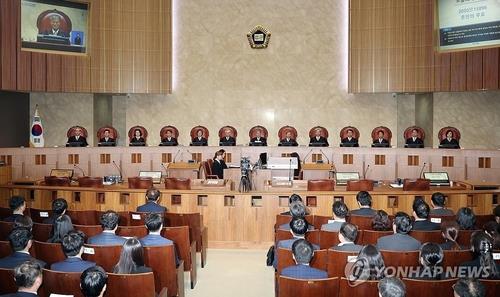Supreme Court breaks precedent to allow nullity of marriage after divorce
SEOUL, May 23 (Yonhap) -- A marriage can be annulled even after it ends in divorce if there are special circumstances, such as the lack of a substantial marital agreement, the Supreme Court said Thursday, breaking from its precedent set for the past 40 years.
Under the previous precedent set in 1984, the top court has maintained the position that the marriage of a divorced couple cannot be invalidated after hand due to a lack of practical benefits.
The court's new precedent comes in a lawsuit filed by a woman who divorced her husband of three years in 2004 and requested the marriage be annulled, saying the marriage was registered without her actual agreement.
She lost the suit in an initial ruling, but the Supreme Court reversed the ruling, sending the case back to the Seoul Family Court.
"Even if the marriage has already been dissolved through divorce, the interest in seeking confirmation of the nullity of the marriage can be recognized," the Supreme Court said in an en banc decision, noting the annulment can be an effective and appropriate means to resolve all marital disputes at once.
The Civil Act's Article 815 stipulates that a marriage is null and void if there is no agreement to marry between the parties or if the marriage is between lineal relatives by affinity. But the Supreme Court ruled in 1984 that the marriage of a divorced couple cannot be annulled afterward because there are no actual benefits from the nullity.
ycm@yna.co.kr
(END)
-
 (URGENT) S. Korea will reconsider issue of arms supply to Ukraine: presidential official
(URGENT) S. Korea will reconsider issue of arms supply to Ukraine: presidential official -
 S. Korea hints at potential arms supply to Ukraine in response to N.K.-Russia treaty
S. Korea hints at potential arms supply to Ukraine in response to N.K.-Russia treaty -
 (LEAD) S. Korea slams N.K.-Russia treaty; hints at potential arms supply to Ukraine
(LEAD) S. Korea slams N.K.-Russia treaty; hints at potential arms supply to Ukraine -
 Romania to buy S. Korean K-9 howitzers for US$920 mln
Romania to buy S. Korean K-9 howitzers for US$920 mln -
 (LEAD) N. Korea, Russia agree to offer military assistance 'without delay' if either is attacked: KCNA
(LEAD) N. Korea, Russia agree to offer military assistance 'without delay' if either is attacked: KCNA
-
 Only 34 pct of S. Korean elites favor nuclearization: CSIS poll
Only 34 pct of S. Korean elites favor nuclearization: CSIS poll -
 Yoon's approval rating falls for 3 weeks straight to 30.2 pct
Yoon's approval rating falls for 3 weeks straight to 30.2 pct -
 Disagreement over ambassador, presidential aide opens up fresh rift between Yoon, PPP leader
Disagreement over ambassador, presidential aide opens up fresh rift between Yoon, PPP leader -
 Political parties ramp up campaign efforts amid shifting opinion polls
Political parties ramp up campaign efforts amid shifting opinion polls -
 (News Focus) U.S. focus on 'interim' steps with N. Korea raises questions about policy direction
(News Focus) U.S. focus on 'interim' steps with N. Korea raises questions about policy direction








